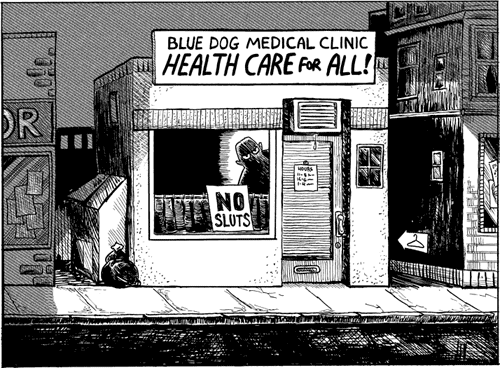
NEW YORK TIMES: WASHINGTON — Congress gave final approval on Sunday to legislation that would provide medical coverage to tens of millions of uninsured Americans and remake the nation’s health care system along the lines proposed by President Obama. By a vote of 219 to 212, the House passed the bill after a day of tumultuous debate that echoed the epic struggle of the last year. The action sent the bill to President Obama, whose crusade for such legislation has been a hallmark of his presidency. Democrats hailed the vote as historic, comparable to the establishment of Medicare and Social Security and a long overdue step forward in social justice. “This is the civil rights act of the 21st century,” said Representative James E. Clyburn of South Carolina, the No.  3 Democrat in the House. After a year of partisan combat and weeks of legislative brinksmanship, House Democrats and the White House clinched their victory only hours before the voting started on Sunday. They agreed to a deal with opponents of abortion rights within their party to reiterate in an executive order that federal money provided by the bill could not be used for abortions, giving the Democrats the final votes. Democrats said that in expanding access to health coverage for uninsured Americans, they were creating a new program every bit as important as Social Security and Medicare, while also putting downward pressure on rising health care costs and reining in federal budget deficits. MORE
3 Democrat in the House. After a year of partisan combat and weeks of legislative brinksmanship, House Democrats and the White House clinched their victory only hours before the voting started on Sunday. They agreed to a deal with opponents of abortion rights within their party to reiterate in an executive order that federal money provided by the bill could not be used for abortions, giving the Democrats the final votes. Democrats said that in expanding access to health coverage for uninsured Americans, they were creating a new program every bit as important as Social Security and Medicare, while also putting downward pressure on rising health care costs and reining in federal budget deficits. MORE
JIM DeMINT (R–SC): “If we’re able to stop Obama on this it will be his Waterloo. It will break him.” MORE
WIKIPEDIA: The Battle of Waterloo was fought on Sunday 18 June 1815 near Waterloo in present-day Belgium. An Imperial French army under the command of Emperor Napoleon was defeated by combined armies of the Seventh Coalition, one an Anglo-Allied army under the command of the Duke of Wellington and the other a Prussian army under the command of Gebhard von Blücher. It was the culminating battle of the Waterloo Campaign and Napoleon’s last. The defeat at Waterloo put an end to Napoleon’s rule as Emperor of the French and marked the end of his Hundred Days‘ return from exile. MORE
 POTUS: Good evening, everybody. Tonight, after nearly 100 years of talk and frustration, after decades of trying, and a year of sustained effort and debate, the United States Congress finally declared that America’s workers and America’s families and America’s small businesses deserve the security of knowing that here, in this country, neither illness nor accident should endanger the dreams they’ve worked a lifetime to achieve. Tonight, at a time when the pundits said it was no longer possible, we rose above the weight of our politics. We pushed back on the undue influence of special interests. We didn’t give in to mistrust or to cynicism or to fear. Instead, we proved that we are still a people capable of doing big things and tackling our biggest challenges. We proved that this government — a government of the people and by the people — still works for the people. FULL TEXT AFTER THE JUMP
POTUS: Good evening, everybody. Tonight, after nearly 100 years of talk and frustration, after decades of trying, and a year of sustained effort and debate, the United States Congress finally declared that America’s workers and America’s families and America’s small businesses deserve the security of knowing that here, in this country, neither illness nor accident should endanger the dreams they’ve worked a lifetime to achieve. Tonight, at a time when the pundits said it was no longer possible, we rose above the weight of our politics. We pushed back on the undue influence of special interests. We didn’t give in to mistrust or to cynicism or to fear. Instead, we proved that we are still a people capable of doing big things and tackling our biggest challenges. We proved that this government — a government of the people and by the people — still works for the people. FULL TEXT AFTER THE JUMP
DAVID FRUM: Conservatives and Republicans today suffered their most crushing legislative defeat since the 1960s. It’s hard to exaggerate the magnitude of the disaster. Conservatives may cheer themselves that they’ll compensate for today’s expected vote with a big win in the November 2010 elections. But:
(1) It’s a good bet that conservatives are over-optimistic about November – by then the economy will have improved and the immediate goodies in the healthcare bill will be reaching key voting blocs.
(2) So what? Legislative majorities come and go. This healthcare bill is forever. A win in November is very poor compensation for this debacle now.
So far, I think a lot of conservatives will agree with me. Now comes the hard lesson: A huge part of the blame for today’s disaster attaches to conservatives  and Republicans ourselves At the beginning of this process we made a strategic decision: unlike, say, Democrats in 2001 when President Bush proposed his first tax cut, we would make no deal with the administration. No negotiations, no compromise, nothing. We were going for all the marbles. This would be Obama’s Waterloo – just as healthcare was Clinton’s in 1994. Only, the hardliners overlooked a few key facts: Obama was elected with 53% of the vote, not Clinton’s 42%. The liberal block within the Democratic congressional caucus is bigger and stronger than it was in 1993-94. And of course the Democrats also remember their history, and also remember the consequences of their 1994 failure. This time, when we went for all the marbles, we ended with none.
and Republicans ourselves At the beginning of this process we made a strategic decision: unlike, say, Democrats in 2001 when President Bush proposed his first tax cut, we would make no deal with the administration. No negotiations, no compromise, nothing. We were going for all the marbles. This would be Obama’s Waterloo – just as healthcare was Clinton’s in 1994. Only, the hardliners overlooked a few key facts: Obama was elected with 53% of the vote, not Clinton’s 42%. The liberal block within the Democratic congressional caucus is bigger and stronger than it was in 1993-94. And of course the Democrats also remember their history, and also remember the consequences of their 1994 failure. This time, when we went for all the marbles, we ended with none.
 Could a deal have been reached? Who knows? But we do know that the gap between this plan and traditional Republican ideas is not very big. The Obama plan has a broad family resemblance to Mitt Romney’s Massachusetts plan. It builds on ideas developed at the Heritage Foundation in the early 1990s that formed the basis for Republican counter-proposals to Clintoncare in 1993-1994. Barack Obama badly wanted Republican votes for his plan. Could we have leveraged his desire to align the plan more closely with conservative views? To finance it without redistributive taxes on productive enterprise – without weighing so heavily on small business – without expanding Medicaid? Too late now. They are all the law. No illusions please: This bill will not be repealed. Even if Republicans scored a 1994 style landslide in November, how many votes could we muster to re-open the “doughnut hole” and charge seniors more for prescription drugs? How many votes to re-allow insurers to rescind policies when they discover a pre-existing condition? How many votes to banish 25 year olds from their parents’ insurance coverage? And even if the votes were there – would President Obama sign such a repeal? We followed the most radical voices in the party and the movement, and they led us to abject and irreversible defeat. MORE
Could a deal have been reached? Who knows? But we do know that the gap between this plan and traditional Republican ideas is not very big. The Obama plan has a broad family resemblance to Mitt Romney’s Massachusetts plan. It builds on ideas developed at the Heritage Foundation in the early 1990s that formed the basis for Republican counter-proposals to Clintoncare in 1993-1994. Barack Obama badly wanted Republican votes for his plan. Could we have leveraged his desire to align the plan more closely with conservative views? To finance it without redistributive taxes on productive enterprise – without weighing so heavily on small business – without expanding Medicaid? Too late now. They are all the law. No illusions please: This bill will not be repealed. Even if Republicans scored a 1994 style landslide in November, how many votes could we muster to re-open the “doughnut hole” and charge seniors more for prescription drugs? How many votes to re-allow insurers to rescind policies when they discover a pre-existing condition? How many votes to banish 25 year olds from their parents’ insurance coverage? And even if the votes were there – would President Obama sign such a repeal? We followed the most radical voices in the party and the movement, and they led us to abject and irreversible defeat. MORE
CNN: Someone shouted “baby killer” Sunday as an anti-abortion Democratic congressman was speaking on the House floor shortly after the chamber  passed a sweeping health care reform bill with his help. It wasn’t clear from whom the shout came. Rep. Bart Stupak, who opposed the bill over its abortion language until he reached a deal with the White House on Sunday, was speaking against a Republican motion to effectively kill the passed legislation Sunday night when several congressmen shouted him down. As the speaker asked for the interruptions to stop, someone yelled “baby killer.” Congressmen groaned, and someone shouted, “Who said that?” Just days earlier, Stupak, D-Michigan, was a hero of anti-abortion House Republicans who opposed the health-care bill. Stupak led a group of other anti-abortion Democrats who rejected the bill because they said it would allow federal funding for abortions beyond the current limits of cases of rape, incest or if the mother’s life is in danger. MORE
passed a sweeping health care reform bill with his help. It wasn’t clear from whom the shout came. Rep. Bart Stupak, who opposed the bill over its abortion language until he reached a deal with the White House on Sunday, was speaking against a Republican motion to effectively kill the passed legislation Sunday night when several congressmen shouted him down. As the speaker asked for the interruptions to stop, someone yelled “baby killer.” Congressmen groaned, and someone shouted, “Who said that?” Just days earlier, Stupak, D-Michigan, was a hero of anti-abortion House Republicans who opposed the health-care bill. Stupak led a group of other anti-abortion Democrats who rejected the bill because they said it would allow federal funding for abortions beyond the current limits of cases of rape, incest or if the mother’s life is in danger. MORE
MCCLATCHY NEWS: Demonstrators outside the U.S. Capitol , angry over the proposed health care bill, shouted “nigg*r” Saturday at U.S. Rep. John  Lewis , a Georgia congressman and civil rights icon who was nearly beaten to death during an Alabama march in the 1960s. The protesters also shouted obscenities at other members of the Congressional Black Caucus , lawmakers said. “They were shouting, sort of harassing,” Lewis said. “But, it’s okay, I’ve faced this before. It reminded me of the 60s. It was a lot of downright hate and anger and people being downright mean.” Lewis said he was leaving the Cannon office building across from the Capitol when protesters shouted “Kill the bill, kill the bill,” Lewis said. “I said ‘I’m for the bill, I support the bill, I’m voting for the bill’,” Lewis said. A colleague who was accompanying Lewis said people in the crowd responded by saying “Kill the bill, then the n-word.” “It surprised me that people are so mean and we can’t engage in a civil dialogue and debate,” Lewis said. Rep. Emanuel Cleaver , D- Mo. , said he was a few yards behind Lewis and distinctly heard “nigg*r.” “It was a chorus,” Cleaver said. “In a way, I feel sorry for those people who are doing this nasty stuff – they’re being whipped up. I decided I wouldn’t be angry with any of them.” Protestors also used a slur as they confronted Rep. Barney Frank , D- Mass. , an openly gay member of Congress . A writer for Huffington Post said the crowd called Frank a “fagg*t.” Frank told the Boston Globe that the incident happened as he was walking from the Longworth office building to the Rayburn office building, both a short distance from the Capitol. Frank said the crowd consisted of a couple of hundred of people and that they referred to him as ‘homo.’ MORE
Lewis , a Georgia congressman and civil rights icon who was nearly beaten to death during an Alabama march in the 1960s. The protesters also shouted obscenities at other members of the Congressional Black Caucus , lawmakers said. “They were shouting, sort of harassing,” Lewis said. “But, it’s okay, I’ve faced this before. It reminded me of the 60s. It was a lot of downright hate and anger and people being downright mean.” Lewis said he was leaving the Cannon office building across from the Capitol when protesters shouted “Kill the bill, kill the bill,” Lewis said. “I said ‘I’m for the bill, I support the bill, I’m voting for the bill’,” Lewis said. A colleague who was accompanying Lewis said people in the crowd responded by saying “Kill the bill, then the n-word.” “It surprised me that people are so mean and we can’t engage in a civil dialogue and debate,” Lewis said. Rep. Emanuel Cleaver , D- Mo. , said he was a few yards behind Lewis and distinctly heard “nigg*r.” “It was a chorus,” Cleaver said. “In a way, I feel sorry for those people who are doing this nasty stuff – they’re being whipped up. I decided I wouldn’t be angry with any of them.” Protestors also used a slur as they confronted Rep. Barney Frank , D- Mass. , an openly gay member of Congress . A writer for Huffington Post said the crowd called Frank a “fagg*t.” Frank told the Boston Globe that the incident happened as he was walking from the Longworth office building to the Rayburn office building, both a short distance from the Capitol. Frank said the crowd consisted of a couple of hundred of people and that they referred to him as ‘homo.’ MORE
PHAWKER: Sarah, how’s that hatey-samey thing workin’ out for ya?
THE WHITE HOUSE
Office of the Press Secretary
______________________________
For Immediate Release March 22, 2010
REMARKS BY THE PRESIDENT
ON THE HOUSE VOTE ON HEALTH INSURANCE REFORM
March 21, 2010
East Room
11:47 P.M. EDT
THE PRESIDENT: Good evening, everybody. Tonight, after nearly 100 years of talk and frustration, after decades of trying, and a year of sustained effort and debate, the United States Congress finally declared that America’s workers and America’s families and America’s small businesses deserve the security of knowing that here, in this country, neither illness nor accident should endanger the dreams they’ve worked a lifetime to achieve.
Tonight, at a time when the pundits said it was no longer possible, we rose above the weight of our politics. We pushed back on the undue influence of special interests. We didn’t give in to mistrust or to cynicism or to fear. Instead, we proved that we are still a people capable of doing big things and tackling our biggest challenges. We proved that this government — a government of the people and by the people — still works for the people.
I want to thank every member of Congress who stood up tonight with courage and conviction to make health care reform a reality. And I know this wasn’t an easy vote for a lot of people. But it was the right vote. I want to thank Speaker Nancy Pelosi for her extraordinary leadership, and Majority Leader Steny Hoyer and Majority Whip Jim Clyburn for their commitment to getting the job done. I want to thank my outstanding Vice President, Joe Biden, and my wonderful Secretary of Health and Human Services, Kathleen Sebelius, for their fantastic work on this issue. I want to thank the many staffers in Congress, and my own incredible staff in the White House, who have worked tirelessly over the past year with Americans of all walks of life to forge a reform package finally worthy of the people we were sent here to serve.
Today’s vote answers the dreams of so many who have fought for this reform. To every unsung American who took the time to sit down and write a letter or type out an e-mail hoping your voice would be heard — it has been heard tonight. To the untold numbers who knocked on doors and made phone calls, who organized and mobilized out of a firm conviction that change in this country comes not from the top down, but from the bottom up — let me reaffirm that conviction: This moment is possible because of you.
Most importantly, today’s vote answers the prayers of every American who has hoped deeply for something to be done about a health care system that works for insurance companies, but not for ordinary people. For most Americans, this debate has never been about abstractions, the fight between right and left, Republican and Democrat — it’s always been about something far more personal. It’s about every American who knows the shock of opening an envelope to see that their premiums just shot up again when times are already tough enough. It’s about every parent who knows the desperation of trying to cover a child with a chronic illness only to be told “no” again and again and again. It’s about every small business owner forced to choose between insuring employees and staying open for business. They are why we committed ourselves to this cause.
Tonight’s vote is not a victory for any one party — it’s a victory for them. It’s a victory for the American people. And it’s a victory for common sense.
Now, it probably goes without saying that tonight’s vote will give rise to a frenzy of instant analysis. There will be tallies of Washington winners and losers, predictions about what it means for Democrats and Republicans, for my poll numbers, for my administration. But long after the debate fades away and the prognostication fades away and the dust settles, what will remain standing is not the government-run system some feared, or the status quo that serves the interests of the insurance industry, but a health care system that incorporates ideas from both parties — a system that works better for the American people.
If you have health insurance, this reform just gave you more control by reining in the worst excesses and abuses of the insurance industry with some of the toughest consumer protections this country has ever known — so that you are actually getting what you pay for.
If you don’t have insurance, this reform gives you a chance to be a part of a big purchasing pool that will give you choice and competition and cheaper prices for insurance. And it includes the largest health care tax cut for working families and small businesses in history — so that if you lose your job and you change jobs, start that new business, you’ll finally be able to purchase quality, affordable care and the security and peace of mind that comes with it.
This reform is the right thing to do for our seniors. It makes Medicare stronger and more solvent, extending its life by almost a decade. And it’s the right thing to do for our future. It will reduce our deficit by more than $100 billion over the next decade, and more than $1 trillion in the decade after that.
So this isn’t radical reform. But it is major reform. This legislation will not fix everything that ails our health care system. But it moves us decisively in the right direction. This is what change looks like.
Now as momentous as this day is, it’s not the end of this journey. On Tuesday, the Senate will take up revisions to this legislation that the House has embraced, and these are revisions that have strengthened this law and removed provisions that had no place in it. Some have predicted another siege of parliamentary maneuvering in order to delay adoption of these improvements. I hope that’s not the case. It’s time to bring this debate to a close and begin the hard work of implementing this reform properly on behalf of the American people. This year, and in years to come, we have a solemn responsibility to do it right.
Nor does this day represent the end of the work that faces our country. The work of revitalizing our economy goes on. The work of promoting private sector job creation goes on. The work of putting American families’ dreams back within reach goes on. And we march on, with renewed confidence, energized by this victory on their behalf.
In the end, what this day represents is another stone firmly laid in the foundation of the American Dream. Tonight, we answered the call of history as so many generations of Americans have before us. When faced with crisis, we did not shrink from our challenge — we overcame it. We did not avoid our responsibility — we embraced it. We did not fear our future — we shaped it.
Thank you, God bless you, and may God bless the United States of America.
END 11:55 P.M. EDT
